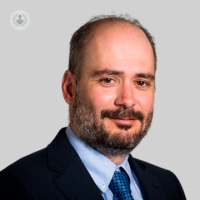An expert insight into fatty liver disease
Written by:Fatty liver disease is the most common cause of liver disease, affecting an estimated 1 in 4 people in the UK.
Here to provide an expert insight into fatty liver disease, including causes, diagnosis and treatment, is Professor Emmanouil Tsochatzis, renowned consultant hepatologist in London.

What is fatty liver disease, and what is the difference between non-alcohol fatty liver disease and alcohol-related liver disease?
Fatty liver disease is a condition characterised by the accumulation of fat in the liver cells. This can compromise liver function over time, causing complications.
There are two types of fatty liver disease:
- Non-alcoholic fatty liver disease (NAFLD): Linked to metabolic factors such as obesity and diabetes. NAFLD can progress from simple fatty liver disease to non-alcoholic steatohepatitis, involving inflammation and potential damage to the liver.
- Alcohol-related liver disease (ALD): Linked to excessive and prolonged alcohol intake. ALD can lead to inflammation and ultimately, cirrhosis.
How is fatty liver disease detected and diagnosed?
Fatty liver disease is often asymptomatic in its early stages.
As fatty liver disease progresses, people may experience the following symptoms:
- persistent weakness and fatigue
- discomfort in the upper right side of the abdomen
Once cirrhosis develops, people may experience:
- unexplained weight loss
- muscle wasting
- a sense of lethargy
- jaundice (yellowing of the skin and the eyes)
Diagnosing fatty liver disease involves a combination of medical history, physical examination, and diagnostic tests.
Common diagnostic tests include:
- Blood tests: Liver function tests measure the levels of liver enzymes and other substances in the blood. Elevated liver enzymes may indicate liver inflammation or liver damage.
- Imaging studies: Ultrasound, CT scans, and MRI scans can provide detailed images of the liver, helping to assess liver health.
- FibroScan®: FibroScan® is a non-invasive test to measure liver stiffness, helping to assess the degree of fibrosis or cirrhosis.
- Liver biopsy: In some cases, a small sample of liver tissue may be obtained for microscopic examination to determine the extent of the liver damage.
Early diagnosis is crucial for the effective management of fatty liver disease, allowing for timely intervention to prevent the progression of the condition.
What lifestyle modifications, including diet and exercise, are effective for managing fatty liver disease?
Adopting a healthy lifestyle is the bottom line for managing fatty liver disease.
Key lifestyle modifications include:
- Weight management: Losing 10 per cent of excess weight, especially around the abdominal area, can significantly improve liver health.
- A balanced diet: A diet rich in fruits, vegetables, whole grains, and lean proteins is beneficial for liver health. Avoiding sugary foods, refined carbohydrates, and excessive saturated fats is essential.
- Regular exercise: Regular physical activity helps with weight management and also improves insulin sensitivity. Patients should aim for at least 150 minutes of moderate-intensity exercise per week.
- Limited alcohol intake: Limited or complete abstinence from alcohol is required.
- Control of diabetes and cholesterol levels: Keeping diabetes under control and maintaining healthy cholesterol levels contributes to overall liver health.
When is a liver transplant considered?
In serious cases of end-stage liver disease, where fatty liver disease has progressed to cirrhosis and the liver has sustained irreversible damage, a liver transplant may be considered. Liver transplantation involves replacing a damaged liver with a healthy liver from a donor.
If you require expert diagnosis and treatment for fatty liver disease, don’t hesitate to book an appointment with Professor Emmanouil Tsochatzis via his Top Doctors profile today.


